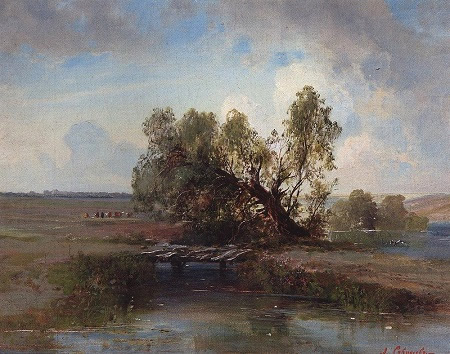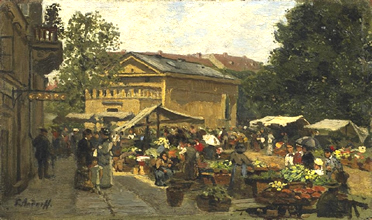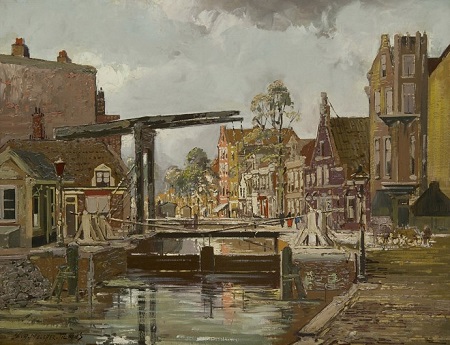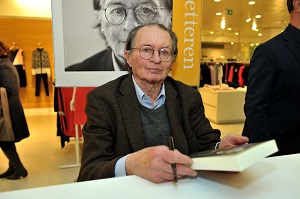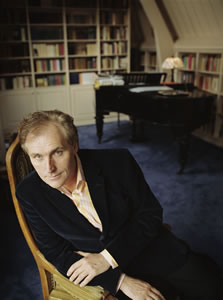De Engelse schrijver en criticus Aldous Huxley werd geboren op 26 juli 1894 in Godalming, Surrey. Zie ook alle tags voor Aldous Huxley op dit blog.
Uit: Aldous Huxley (Biografie door Nicholas Murray)
„’Born into the rain,’ Aldous Huxley told the New York Herald Tribune in 1952, ‘I have always felt a powerful craving for light.’ Huxley had in mind his lifelong struggle with defective eyesight, which sent him first to the Mediterranean and then to Southern California. But the wider metaphor is irresistible. His life was a constant search for light, for understanding, of himself and his fellow men and women in the twentieth century. This intellectual ambition — not unknown but rare in English novelists — sent him far beyond the confines of prose fiction into history, philosophy, science, politics, mysticism, psychic exploration. He offered as his personal motto the legend hung around the neck of a ragged scarecrow of a man in a painting by Goya: aun aprendo. I am still learning. Grandson of the great Victorian scientist Thomas Henry Huxley — ‘Darwin’s bulldog’ — he had a lifelong passion for truth, artistic and scientific. His field of interest, declared Isaiah Berlin after his death, was nothing less than ’the condition of men in the twentieth century’.
Like an eighteenth century philosophe, a modern Voltaire — though in truth he found that historical epoch lacking in depth and resonance — he took the whole world as his province, and like those urbane thinkers he did it with consummate clarity and grace, was frequently iconoclastic, and struck many of his contemporaries in the early decades of the twentieth century as a liberator and a herald of the modern age of secular enlightenment and scientific progress. He was also an often disturbingly accurate prophet who became steadily more disillusioned with the uses to which science was being put in his time.
Aldous Huxley (26 juli 1894 – 22 november 1963)
Portret door Vanessa Bell
De Nederlandse schrijver Arthur Japin werd geboren in Haarlem op 26 juli 1956. Zie ook alle tags voor Arthur Japin op dit blog.
Uit: Een schitterend gebrek
“Amsterdam 1758
Die avond, waarop alles in een nieuw licht kwam te staan, zou ik zoals alle donderdagen eigenlijk dineren met mijnheer Jamieson, een groothandelaar in huiden en tabak, en misschien daarna samen wat gaan dansen. Alleen omdat zijn jicht hem overvallen had en de goede man moest afzeggen, besloot ik mijn loge in de opera op te zoeken.
Begrijp me niet verkeerd, ik heb altijd sober geleefd. Vanaf het moment dat het onheil toesloeg en ik door het leven werd voortgejaagd was ik spaarzaam. Ik moest wel, omdat ik lange tijd niet wist wat de volgende dag mij zou brengen. Of ik te eten zou hebben. Of er voor mij zou worden gezorgd. Of ik aangevallen zou worden en verder opgejaagd. Ook toen ik dan uiteindelijk in Amsterdam een zekere positie had verworven heb ik mij nooit meer aangemeten dan de uitdossing die de kringen waarin ik verkeerde van mij verwachtten en natuurlijk zaken die ik nodig had voor de uitoefening van mijn vak. Buitenissigheden heb ik mij nooit veroorloofd. Ik heb er ook niet naar getaald. Dit stond ik mijzelf de laatste jaren echter wel toe: een vaste logeplaats in de Franse schouwburg aan de Overtoom, die ik bezocht zodra ik mij daarvoor vrij kon maken.
Daarheen was ik die avond, half oktober, dus op weg. Ik had zoals ik gewend was een bootsman met een kleine, maar propere sloep gehuurd. Het was kil. De kou op de grachten is in Amsterdam anders dan in Venetië. Hij begint maanden vroeger, dringt het lichaam sneller en scherper binnen en nestelt zich eerder in de botten dan in de longen. Toch ga ik liever met de boot dan met een rijtuig. De mensen op de kade slaan geen acht op wie voorbijvaart. Zij gaan op in hun gesprekken.”

Arthur Japin (Haarlem, 26 juli 1956)
De Vlaamse schrijfster Anne Provoost werd geboren in Poperinge op 26 juli 1964. Provoost groeide op in Woesten, in de Belgische Westhoek. Ze begon met schrijven toen ze vier was. Omdat ze toen technisch nog niet kon schrijven, dicteerde ze verhalen aan haar moeder. Later schreef ze boeken die ze zelf illustreerde. Toen ze literatuur ging studeren aan de universiteit in Kortrijk en Leuven, nam ze zich voor om niet meer te schrijven. Toen ze tijdens haar laatste jaar Germaanse Talen ziek in bed lag, schreef ze een verhaal. Tot haar grote verbazing won ze daarmee een wedstrijd. Anne Provoost schrijft gelaagde actuele en historische romans. Bekende titels van haar hand zijn: De roos en het zwijn, De arkvaarders, In de zon kijken en Beminde ongelovigen. Haar boeken kregen talrijke prijzen en werden herhaaldelijk vertaald. Haar roman Vallen werd in 2001 verfilmd door Hans Herbots.
Uit: De roos en het zwijn
“Ik was aan het melken toen ik de hoeven van een vijftiental paarden op het pad hoorde. Het was schemerdonker, en wat opviel waren de walmende fakkels van
ricinushout die de ruiters droegen, waardoor hun gezicht er grimmig en hun wapenuitrusting er vervaarlijk uitzagen.
Ter hoogte van het huis van Orlinde hielden ze stil. Ze bleven een ogenblik staan beraadslagen en wezen naar het raampje van waaruit Orlinde ongetwijfeld stond te kijken. Op een teken van de eerste ruiter gaven ze hun paard de sporen en kwamen in galop in mijn richting. Het schrille geschreeuw en het licht van de fakkels deden de koe schrikachtig trappelen en met haar poten slaan, en in een snelle reflex schoof ik de halfvolle emmer melk achteruit. Ik liep naar het pad om te zien wat er gebeurde.
Ze waren opvallend zwaar bewapend. De eerste die mijn aandacht trok herkende ik ogenblikkelijk aan zijn ronde, bijna aantrekkelijke gezicht waarop een vriendelijkheid lag die in tegenspraak was met de manier waarop hij op zijn paard zat, schreeuwde en er nors probeerde uit te zien. Het was de man die me ooit onder bedreiging met een scherp mes het bos in gesleurd had en gezegd had dat hij gekomen was om heel diep in me te gaan. Over zijn linkeroog droeg hij een donkere lap. Door wat er toen gebeurd was, had ik het gevoel dat ik elk onderdeel van zijn lichaam en elk aspect van zijn karakter kende. Hij was de jongste en de kleinste van het gezelschap, maar duidelijk de gevaarlijkste. Hij was gekwetst, niet alleen in zijn mooie meisjesgezicht, maar ook in zijn ziel, en dat maakte hem fanatiek en vernielzuchtig”.

Anne Provoost (Poperinge, 26 juli 1964)
De Vlaamse schrijver Yves Petry werd op 26 juli 1967 geboren in Tongeren. Hij studeerde wiskunde en wijsbegeerte in Leuven, publiceerde verhalen in DW&B en in NWT en hij debuteerde in 1999 bij De Bezige Bij met de roman Het jaar van de man. Vervolgens verschenen van zijn hand Gods eigen muziek (2001), De laatste woorden van Leo Wekeman (2003) en De achterblijver (2006). Petry werd voor zijn oeuvre onderscheiden met de BNG Nieuwe Literatuurprijs 2006.
Uit: Alle mensen worden broeders
“Het litteken op mijn kin is niet het gevolg van een of ander gebeuren met kosmische inslag, maar dat zal er me niet van weerhouden om, in afwachting van de Grote Finale, eens te vertellen hoe ik het heb opgelopen. Het gebeurde op de avond dat ik definitief besloot van mijn vrouw af te gaan. Dat voornemen had nu al maandenlang als een dolmakend insect om mijn hoofd heen gezoemd op zoek naar een gaatje om in mijn schedel te kruipen en er zich te ontpoppen tot kloek besluit. En ik had er lange tijd ogen en oren, neus en mond voor gesloten gehouden, maar tenslotte had het zich op eigen kracht een gangetje geboord en die avond was het in m’n lobben gerijpt tot het zeer dringende en dwingende ‘weg van die vrouw’. Ik had aanvankelijk niet eens overdreven veel gedronken, maar toen de fles wijn, waardoor ik me had laten aanvuren, helemaal leeg was, schrok ik toch enigszins van de doortastende persoon die ik plots was geworden, en liep ik, zonder mijn vrouw iets te vertellen, weg uit m’n kubus, de stad in, om me in diverse drankgelegenheden nader te beraden over de gevolgen van mijn beslissing.
Het was een ijskoude novemberavond, het vroor vingers en tenen, en ik hield er stevig de pas in terwijl ik me naar het eerste café spoedde. Ik verkeerde niet bepaald in de stemming om in de takken te gaan zitten en een vrolijk lied te fluiten. Onderweg hield ik plots halt, getroffen door de geur van verse kalk. Ik bevond me voor een huis in aanbouw dat langs zijn zwarte venster- en deurloze openingen het aroma van nieuwheid verspreidde.“

Yves Petry (Tongeren, 26 juli 1967)
De Engelse schrijver Nicholas Evans werd geboren op 26 juli 1950 in Bromsgrove. Zie ook alle tags voor Nicholas Evans op dit blog.
Unit: The Divide
“They rose before dawn and stepped out beneath a moonless sky aswarm with stars. Their breath made clouds of the chill air and their boots crunched on the congealed gravel of the motel parking lot. The old station wagon was the only car there, its roof and hood veneered with a dim refracting frost. The boy fixed their skis to the roof while his father stowed their packs then walked around to remove the newspaper pinned by the wipers to the windshield. It was stiff with ice and crackled in his hands as he balled it. Before they climbed into the car they lingered a moment, just stood there listening to the silence and gazing west at the mountains silhouetted by stars.
The little town had yet to wake and they drove quietly north along Main Street, past the courthouse and the gas station and the old movie theater, through pale pools of light cast by the street lamps, the car’s reflection gliding the darkened windows of the stores. And the sole witness to their leaving was a grizzled dog who stood watch at the edge of town, its head lowered, its eyes ghost-green in the headlights.
It was the last day of March and a vestige of plowed snow lay gray along the highway’s edge. Heading west across the plains the previous afternoon, there had been a first whisper of green among the bleached grass. Before sunset they had strolled out from the motel along a dirt road and heard a meadowlark whistling as if winter had gone for good. But beyond the rolling ranch land, the Rocky Mountain Front, a wall of ancient limestone a hundred miles long, was still encrusted with white and the boy’s father said they would surely still find good spring snow.”

Nicholas Evans (Bromsgrove, 26 juli 1950)
De Ierse toneelschrijver, socialist en theatercriticus George Bernard Shaw werd geboren in Dublin op 26 juli 1856. Zie ook alle tags voor George Bernard Shaw op dit blog.
Uit: You Never Can Tell
“Act I
In a dentist’s operating room on a fine August morning in 1896. Not the usual tiny London den, but the best sitting room of a furnished lodging in a terrace on the sea front at a fashionable watering place.
The operating chair, with a gas pump and cylinder beside it, is half way between the centre of the room and one of the corners. If you look into the room through the window which lights it, you will see the fireplace in the middle of the wall opposite you, with the door beside it to your left; an M.R.C.S. diploma in a frame hung on the chimneypiece; an easy chair covered in black leather on the hearth; a neat stool and bench, with vice, tools, and a mortar and pestle in the corner to the right.
Near this bench stands a slender machine like a whip provided with a stand, a pedal, and an exaggerated winch. Recognising this as a dental drill, you shudder and look away to your left, where you can see another window, underneath which stands a writing table, with a blotter and a diary on it, and a chair. Next the writing table, towards the door, is a leather covered sofa. The opposite wall, close on your right, is occupied mostly by a bookcase. The operating chair is under your nose, facing you, with the cabinet of instruments handy to it on your left.
You observe that the professional furniture and apparatus are new, and that the wall paper, designed, with the taste of an undertaker, in festoons and urns, the carpet with its symmetrical plans of rich, cabbagy nosegays, the glass gasalier with lustres; the ornamental gilt rimmed blue candlesticks on the ends of the mantelshelf, also glass-draped with lustres, and the ormolu clock under a glass-cover in the middle between them, its uselessness emphasized by a cheap American clock disrespectfully placed beside it and now indicating 12 o’clock noon, all combine with the black marble which gives the fireplace the air of a miniature family vault, to suggest early Victorian commercial respectability, belief in money, Bible fetichism, fear of hell always at war with fear of poverty, instinctive horror of the passionate character of art, love and Roman Catholic religion, and all the first fruits of plutocracy in the early generations of the industrial revolution.”

George Bernard Shaw (26 juli 1856 – 2 november 1950)
De Franse dichter en essayist Claude Esteban werd geboren op 26 juli 1935 in Parijs. Zie en ook alle tags voor Claude Esteban op dit blog.
Uit: La mort à distance
“Nous allions lui rendre visite à l’improviste, un matin, un soir, juste pour nous assurer qu’il était bien là. Sans même nous concerter, nous obéissions à un rituel immuable. Nous le reconnaissions de loin, dominant de toute sa masse l’entrelacs tortueux des pins, et nous marchions vers lui, soudain silencieux, délivrés du bruit du monde. La jeune femme s’approchait la première, elle souriait un peu, s’assurait que personne ne risquait de la surprendre, puis très vite, elle étreignait l’arbre de tout son corps, les bras ouverts en serrant le tronc énorme, la tête contre l’écorce, les yeux clos. Je faisais mine de m’impatienter, je me moquais doucement de cette étrange façon de saluer notre ami, de le séduire, mais quand elle se retournait, je lisais dans son regard le bonheur qu’elle venait de vivre. Elle avait entendu, me disait-elle, battre le coeur de l’arbre, elle avait senti sous ses doigts la sève lente qui montait, qui lui communiquait de sa force.
La jeune femme rayonnait, elle voulait que je suive son exemple, et moi, si pudibond, je m’enhardissais, et j’effleurais d’une main furtive cette monstrueuse patte posée là pour toujours sur la pelouse.
C’était un soir, c’était un matin, et depuis tant d’années. Pourquoi a-t-il fallu qu’une tempête s’interpose entre l’arbre et nous, que la foudre le blesse, que se réveillent les mauvais démons? Nous n’avons pas cédé, l’arbre est intact dans notre mémoire. C’est à nous, maintenant, qu’il appartient de veiller sur lui, de l’enraciner dans ce temps que nous inventons ensemble. »
Claude Esteban (26 juli 1935 – 10 april 2006)
De Franse schrijver André Maurois (eig. Emile Salomon Wilhelm Herzog) werd geboren op 26 juli 1885 in Elbeuf. Zie en ook alle tags voor Anré Maurois op dit blog.
Uit: Gide (Vertaald door Carl Morse)
“The core of the book was a recit by Menalque, one not far different from a recit Gide might have given after his African rebirth….
This recit contains the essence of the “tidings” of Les Nourritures. First a negative doctrine: flee families, rules, stability. Gide himself suffered so much from “snug homes” that he harped on its dangers all his life.
Then a positive doctrine: one must seek adventure, excess, fervor; one should loathe the lukewarm, security, all tempered feelings. “Not affection, Nathanael: love …” Meaning not a shallow feeling based on nothing perhaps but tastes in common, but a feeling into which one throws oneself wholly and forgets oneself. Love is dangerous, but that is yet another reason for loving, even if it means risking one’s happiness, especially if it means losing one’s happiness. For happiness makes man less. “Descend to the bottom of the pit if you want to see the stars.” Gide insists on this idea that there is no salvation in contented satisfaction with oneself, an idea he shares with both a number of great Christians and with Blake: “Unhappiness exaults, happiness slackens.” Gide ends a letter to an amie with this curious formula: “Adieu, dear friend, may God ration your happiness!”

Anré Maurois (26 juli 1885 – 9 oktober 1967)
De Amerikaanse schrijver Paul Gallico werd geboren op 26 juli 1897 in New York. Zie ook alle tags voor Paul Gallico op dit blog.
Uit: The Snow Goose
“The bird fluttered. With his good hand Rhayader spread on of its immense white pinions. The end was beautifully tipped with black.
Rhayader looked and marvelled, and said: ‘Child: where did you find it?’
‘In t’ marsh, sir, where fowlers had been. What — what is it, sir?’
‘It’s a snow goose from Canada. But how in all heaven came it here?’
The name seemed to mean nothing to the little girl. Her deep violet eyes, shining out of the dirt on her thin face, were fixed with concern on the injured bird.
She said: ‘Can ‘ee heal it, sir?’
‘Yes, yes,’ said Rhayader. ‘We will try. Come, you shall help me.’
There were scissors and bandages and splints on a shelf, and he was marvelously deft, even with the rooked claw that managed to hold things.
He said: ‘Ah, she has been shot, poor thing. Her leg is broken, and the wing tip! but not badly. See, we will clip her primaries, so that we can bandage it, but in the spring the feathers will grow and she will be able to fly again. We’ll bandage it close to her body, so that she cannot move it until it has set, and then make a splint for the poor leg.’
Her fears forgotten, the child watched, fascinated, as he worked, and all the more so because while he fixed a fine splint to the shattered leg he told her the most wonderful story.

Paul Gallico (26 juli 1897 – 15 juli 1976)
De Spaanse schrijver en dichter Antonio Machado Ruiz werd op 26 juli 1875 in Sevilla geboren. Zie ook alle tags voor Antonio Machado op dit blog.
Fields of Soria
Hills of silver plate,
grey heights, dark red rocks
through which the Duero bends
its crossbow arc
round Soria, shadowed oaks,
stone dry-lands, naked mountains,
white roads and river poplars,
twilights of Soria, warlike and mystical,
today I feel, for you,
in my hearts depths, sadness,
sadness of love! Fields of Soria,
where it seems the stones have dreams,
you go with me! Hills of silver plate,
grey heights, dark red rocks.
Antonio Machado (26 juli 1875 – 22 februari 1939)
De Duitse schrijver en journalist Hans Bergel werd geboren op 26 juli 1925 in Râşnov (Duits:Rosenau), Siebenbürgen ofwel Transsylvanië, Roemenië. Zie en ook alle tags voor Hans Bergel op dit blog.
Uit: Wenn die Adler kommen
“Wenn der Passwind von Fundata herab ins Hochland gegen Rosenau hin um Türme und Mauern strich, sei die Stunde der Geistergeschichten oben auf dem Schloss gekommen, erzählte sich das Volk – im übrigen sei hier festgehalten, dass der Ire Bram Stoker zwar behauptet, sein Romanheld Jonathan Harker habe sich durch das nordsiebenbürgische Hochland geradewegs ostwärts über die Stadt Bistritz dem Schloss des Grafen Dracula im Bargau-Pass genähert. Doch das ist freie Erfindung des Dubliners. Denn der einzige Mächtige dieser Landstriche, dessen Namen je mit dem Teufel – mit “dracul” wie dieser im Rumänischen heißt – in Verbindung zu bringen ist, war Vlald der Pfähler. Von 1456 bis 1462 Herrscher der Walachei in der Donautiefebene, hielt er sich nachweislich niemals in den Ostkarpaten auf. Hingegen tat er es in den Südkarpaten, eben auf Schloss Törzburg, wo er mit seinem Gefolge inmitten bei lebendigem Leibe auf Pfähle gespießten schwangerer Frauen und Kinder zechte und so zu einer der fragwürdigsten Kultfiguren des westeuropäischen Literaturpublikums wurde. Bram Stoker gehört damit zu jenen Landfremden, die bis in unsere Tage herauf mit schludrigen Nachforschungen Durcheinander in das Bild bringen, das die Welt draußen von diesem Siebenbürgen hat. Hätte sich sonst denn die geschiedene Helena an den Sommerabenden auf dem nahe am Königstein gelegenen Schloss so köstlich amüsiert?

Hans Bergel (Râşnov, 26 juli 1925)
De Indonesische dichter Chairil Anwar werd geboren op 26 juli 1922 in Medan. Zie ook alle tags voor Chairil Anwar op dit blog.
.
The Seized and the Severed
the darkness and passing wind overtake me
and the room where the one I long for shivers
with night’s penetration; trees stand like dead memorials
but in Karet, yes, Karet Cemetery – my future locale – there, the wind howls, too
I put my room in order, and myself as well, in the chance that you might come
and I may once again unleash a new story for you;
but now it’s only my hands that move, emptily
my body is still and alone, as frozen stories and events pass by
Chairil Anwar (26 juli 1922 – 28 april 1949)
